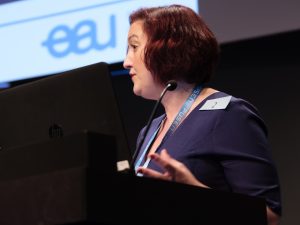Advancing Collaborative Research in Spinal Dysraphism and Neurogenic Bladder Care
 On 14-15 November 2024, experts, clinicians, and researchers gathered at the Hôpital Rothschild, Paris, for a workshop by the Spina Bifida and Other Dysraphisms (SBoD) Working Group. This event was a joint initiative of the EC-funded European Reference Networks ERN eUROGEN, ERN ITHACA, and ERN ERKNet, showcasing the power of collaboration in addressing complex medical conditions such as spinal dysraphism and neurogenic bladder. The meeting, expertly hosted by Professor Jean Marie Jouannic, served as a platform for knowledge exchange, fostering innovative approaches in diagnostics, management, and patient care.
On 14-15 November 2024, experts, clinicians, and researchers gathered at the Hôpital Rothschild, Paris, for a workshop by the Spina Bifida and Other Dysraphisms (SBoD) Working Group. This event was a joint initiative of the EC-funded European Reference Networks ERN eUROGEN, ERN ITHACA, and ERN ERKNet, showcasing the power of collaboration in addressing complex medical conditions such as spinal dysraphism and neurogenic bladder. The meeting, expertly hosted by Professor Jean Marie Jouannic, served as a platform for knowledge exchange, fostering innovative approaches in diagnostics, management, and patient care.
Day 1: Focus on Genetics and Perinatal Evaluation
The workshop commenced with discussions on the genetic underpinnings of neural tube defects (NTDs). Talks by experts like M. Faoucher and S. Odent covered advancements in whole genome analysis and its implications for understanding digenic inheritance patterns, particularly involving PAX3 and SFRP5 in syndromic myelomeningocele.
Later sessions shifted focus to the perinatal evaluation of bladder function. Key questions, such as the feasibility of in-utero bladder function assessment and the impact of foetal surgery for myelomeningocele on postnatal urological outcomes, were discussed by leading figures like J. Deprest and C. Radmayr. These insights were further explored during a robust panel discussion involving multidisciplinary experts.
Day 2: ORPHANET Updates and Guideline Development
The second day spotlighted updates to the ORPHANET classification for dysraphisms, with insights from care providers and patient representatives. Interactive sessions emphasised patient-centric approaches in refining classifications and ensuring their utility across diverse clinical settings.
Discussions then turned to innovative management strategies for neurogenic bladder, with presentations highlighting the role of extracellular matrix remodelling and the challenges surrounding sexual function and fertility in spina bifida patients. The session concluded with a lecture on the collaborative development of European guidelines for managing spinal dysraphism, underscoring ERN eUROGEN’s commitment to harmonising standards of care across Europe.
Building Momentum for Future Collaboration
The workshop wrapped up with a roundtable discussion on building a database for prenatal cases of dysraphism, spearheaded by J. M. Jouannic. Participants reflected on the next steps in research and collaboration, solidifying the meeting’s role as a catalyst for progress.
Looking Ahead
This workshop underscored the importance of interdisciplinary and inter-network collaboration in tackling rare and complex conditions. The discussions and outcomes pave the way for future innovations, strengthened by the shared commitment of all participants to improving patient outcomes.
We look forward to the next steps in translating these discussions into tangible progress, reaffirming ERN eUROGEN’s dedication to excellence in care and research.





